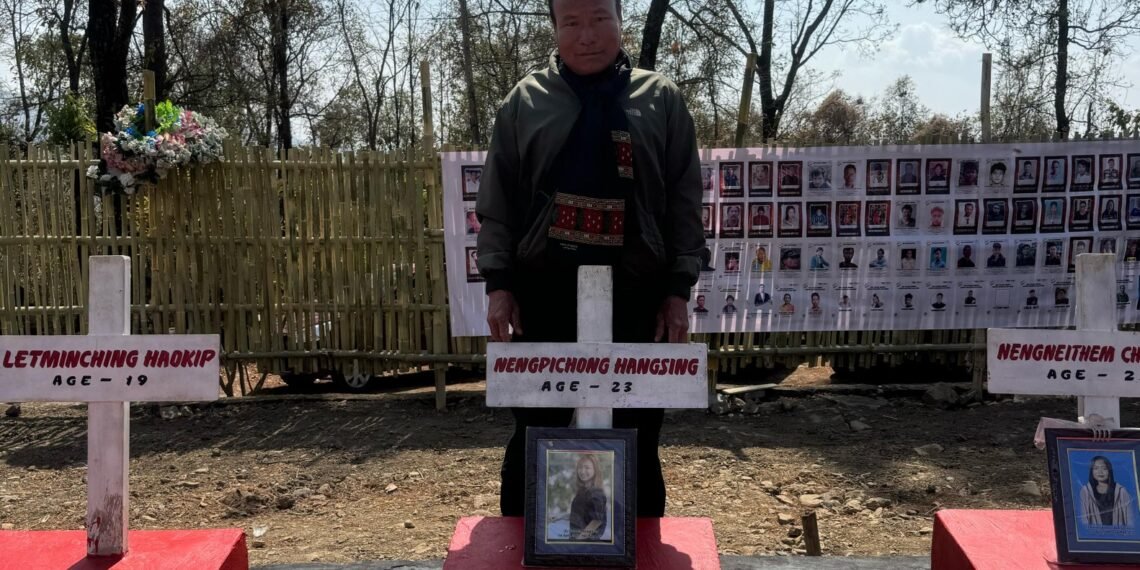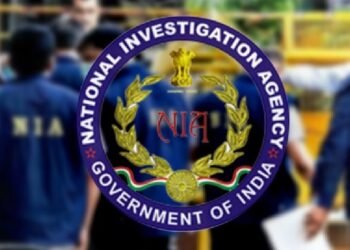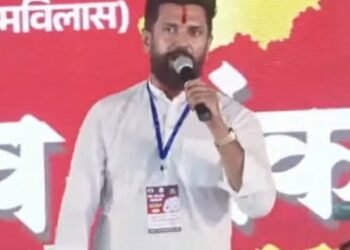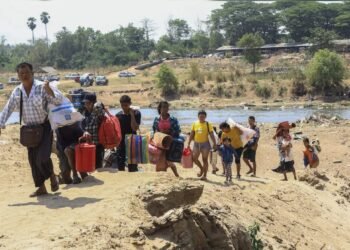The Kuki Women Organisation for Human Rights (KWOHR) spearheaded a vital aid program at Phaijang, distributing funds to victims’ families, demonstrating extraordinary self-reliance in the face of government inaction. This act of solidarity underscored the community’s strength and resolve.
Marking the 22nd month since the outbreak of the Manipur violence, thousands of Kuki-Zo people gathered at the Phaijang Martyrs’ Cemetery in the Sadar Hills, Kangpokpi district, today. The convergence, organised by the Committee on Tribal Unity (CoTU) and the Kuki Women Organisation for Human Rights (KWOHR), reverberated with the demand for a separate Union Territory and their enduring commitment to supporting victims of the ongoing conflict.
The “22nd Remembrance Day” coincided with the fifth phase of KWOHR’s “Jangnadop” program, a vital initiative providing crucial financial aid to families of Kuki-Zo victims. The KWOHR distributed Rs. 1 lakh to each affected individual, a feat accomplished entirely through the generous contributions of Kuki women across the nation, without any state or central government funding. This act of community support highlighted the deep sense of solidarity and the determination to address the ongoing humanitarian crisis.
Today marks the 22nd month of #ManipurViolence with a powerful observance by CoTU and the Kuki Women Organisation for Human Rights (KWOHR). Together, they held “The 22nd Remembrance Day” and distributed funds during the 5th Phase of the “Jangnadop” program at the Kuki-Zo Martyr’s… pic.twitter.com/ov7VyNSiDS
— Sumkawn (@Sumkawn) March 3, 2025
The Phaijang Martyrs’ Cemetery, a site of profound symbolic significance, served as the central venue for these events. This hallowed ground, a memorial to Kuki-Zo individuals who have perished in the current conflict and past struggles, provided a powerful backdrop for emotional speeches and resolute declarations.
The gathering served as a poignant reminder of the community’s collective trauma, reinforcing their determination to honor the sacrifices made and to pursue self-governance through a separate Union Territory. The events at Phaijang underscored the Kuki-Zo community’s continued sense of alienation and their steadfast commitment to seeking a distinct political future
ALSO READ: IIT Baba Abhay Singh detained in Jaipur with marijuana
Key Resolutions Adopted:
The public meeting resulted in the adoption of several critical resolutions, signaling a hardening of the Kuki-Zo community’s stance:
- Unwavering Pursuit of Union Territory Status: The primary resolution reiterated the demand for a separate Union Territory, encompassing Kuki-Zo inhabited areas of Manipur. This demand is rooted in the belief that only direct central administration can ensure their safety and protect their rights.
- Complete Disengagement from the Manipur Government: The community resolved to sever all forms of cooperation and dialogue with the Manipur state government, reflecting a complete breakdown of trust.
- Ban on Meitei Armed Groups: Recognizing the security threat posed by Meitei groups such as Arambai Tenggol and VBIGs, the community declared a ban on their free movement within Kuki-Zo areas. This decision underscores the community’s focus on self-defense.
- Rejection of Imposed Peace Accords: The Kuki-Zo leadership emphasized that they would not accept any peace settlements that do not address their fundamental demands for justice and autonomy.
- Consolidation of Kuki-Zo Unity: A central theme of the gathering was the need to strengthen solidarity among the Kuki-Zo community. Leaders stressed the importance of unified action to resist perceived oppression.
- Direct Appeal to the Government of India: The community called upon the Indian government to intervene decisively and address their grievances. They urged the central government to recognize the urgency of the situation and take concrete steps towards a lasting solution.
ALSO READ: Peace Without Justice Is an Illusion’: Kuki Human Rights Group Speaks Out
Humanitarian Crisis and Displacement:
The ongoing conflict has resulted in a severe humanitarian crisis, with tens of thousands of Kuki-Zo people displaced from their homes and residing in relief camps. The community faces challenges related to access to food, shelter, and medical care. The emotional and psychological toll of the violence is also significant.
The lack of accountability for the perpetrators of the violence that erupted in Manipur on May 3, 2023, remains a significant concern. Reports from human rights organizations and news outlets highlight a perceived failure of both state and central authorities to effectively investigate and prosecute those responsible. This has fostered a climate of impunity, further exacerbating tensions between the affected communities.
Allegations of biased investigations and a lack of decisive action have eroded public trust in the justice system, leaving many victims feeling abandoned and disenfranchised. The slow progress in bringing those responsible to justice has deepened the sense of grievance and fueled perceptions that certain groups are being shielded from accountability.
The consequences of this lack of prosecution are far-reaching. The absence of justice not only prolongs the suffering of victims and their families but also undermines efforts to achieve lasting peace and reconciliation. Without a clear demonstration that perpetrators will be held accountable, the cycle of violence risks perpetuation. The failure to deliver justice also has broader implications for the rule of law and the protection of human rights in India. International human rights bodies have called upon the Indian government to take urgent steps to ensure thorough and impartial investigations, and to hold those responsible for the violence accountable. The ongoing situation reinforces the urgent need for transparent and effective mechanisms to ensure justice and prevent future outbreaks of violence












